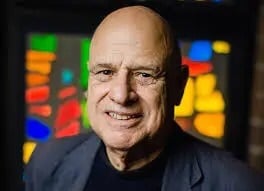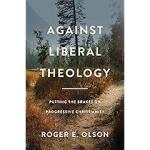Prophetic Tony Campolo: 1985 Warning for America
Many American evangelical Christians don’t remember Tony Campolo. He died recently. During the 1980s, also before and after, he was a major evangelical influencer, especially in American evangelical academic circles. He wrote popular books. He spoke at most evangelical colleges and universities and many churches. I read his books and heard him speak many times. I only met him once and it was not a satisfying meeting. However, I respected him for his strenuous efforts to get evangelicals to take social justice seriously.
Recently I took up one of his books that I read years ago, probably in or around 1985. I was then teaching at Bethel College in Minnesota, a (then) centrist evangelical liberal arts college. A friend asked me to recommend a good book about Christian philosophy. I recommended Campolo’s 1985 book We Have Met the Enemy and They Are Partly Right (Word). The original title was Partly Right: Christianity Responds to Its Critics.
I can highly recommend the book—if you can find it. It’s now out of print (so far as I can discover), but I bought a used and very cheap copy from abebooks.com. (I lost or gave away my personal copy some time ago when I moved and had to reduce my library.)
On pages 60-63 Campolo issues “A Warning for America.” This is the final section of his chapter on Hegel. Campolo drew a line from Hegel to Hitler and Naziism but without blaming Hegel personally. Hegel’s elevation of Prussian culture and society led, certainly inadvertently, to Germany’s extreme nationalism in the 1930s and 1940s.
Then Campolo prophecies to America. In 1985 he said that most Americans think what happened in Germany could not happen here. Then: “And yet there are disturbing signs in contemporary America. A cultural religion has emerged…that gives evidence of providing an ideology for a fascist movement.” (Page 60)
Due to copyright restrictions I can’t quote this whole section or most of it. However, I want to quote a few especially pithy and relevant statements. Remember, this was written in 1985.
”There is in America a new burst of nationalism that increasingly resembles a distorted Hegelian mindset.” He then cites several common sayings often heard such as “American has been chosen by God to be His instrument for saving the world” and “Extremism in the name of patriotism is no vice.”
In case you doubt that Campolo was on to something, way back in 1985, I recall hearing a well-known and influential evangelical evangelist say such things at a denominational convention and also at a mega church. His web site and books reflected a budding American Christian nationalism as well as Social Darwinism. I heard him say to a large evangelical audience: “If you want to get people out of the slums, you have to first get the slums out of the people.” And similar declarations.
On to Campolo: “Most Americans have been seduced into a religion of Americanism which increasingly is confused with and substituted for evangelical Christianity.” (P. 61) Also, “The nationalistic religion is gradually developing a doctrinal system of its own.” Campolo was doing “political theology”—examining an ideology as a covert theology from a theological point of view.
Then: “Too many Americans are coming to believe that God is most fully expressed in the American culture, and concomitantly, that God is an America.” Then this: “Our politicians have learned that there are votes and money to insure their reelections if only they will promised to make America, once again, a Christian nation.” (P. 62)
Campolo ends the chapter this way: “If we are to avoid the kind of cultural religion that led Germany into fascism we must be on guard against nationalistic extremism.” (P. 63)
I remember 1985. Campolo’s warnings seemed dire, almost a “Chicken Little” kind of mentality. And yet, having lived in Germany and studied the rise of fascism there, I believed he was on to something as I surveyed American Christian culture, especially among conservative Christians. Pat Robertson was becoming involved in politics, making noises about Christianity and politics that made me wonder what was happening. An aunt and uncle contacted me to join them in supporting Robertson’s bid for the Republican nomination. (That was in 1982, but Robertson’s political ambitions continued and were strong in 1985.)
My friend and I read We Have Met the Enemy and They are Partly Right recently, together, discussing the book chapter by chapter. He is much younger than I am, about half my age, so he does not remember 1985 or know very much about what was happening in American Christian culture then. I do, so I can tell him that now, from today’s perspective, I think Campolo was prescient. He picked up on Campolo’s “Warning for America” and was surprised by how prescient Campolo was about today’s American political and religious cultures.
In 1985 or 1986, I don’t remember which year, I visited an American mega church on the Sunday closest to July 4, Independence Day. The entire Sunday morning service was worship of America. Of course, the pastors and most of the congregation would not have admitted that, but the symbolism and language amounted to that. I was shocked. I remember thinking “Tony might be right.” Now, I’m sure he was right.
In Germany, sometime in the 1930s, a large group of Protestant pastors, led by Karl Barth (who was actually Swiss) and Dietrich Bonhoeffer and others anti-Nazi Christians, formed “The Confessing Church” movement. They dared to stand up against the “German Christians” among them, in the Protestant churches, who supported Hitler and National Socialism. What would it take for Campolo-like American Christians to do something like that here, now?
*Note: If you choose to comment, make sure your comment is relatively brief (no more than 100 words), strictly on topic, addressed to me, civil and respectful (not hostile or argumentative), and devoid of pictures or links.*














